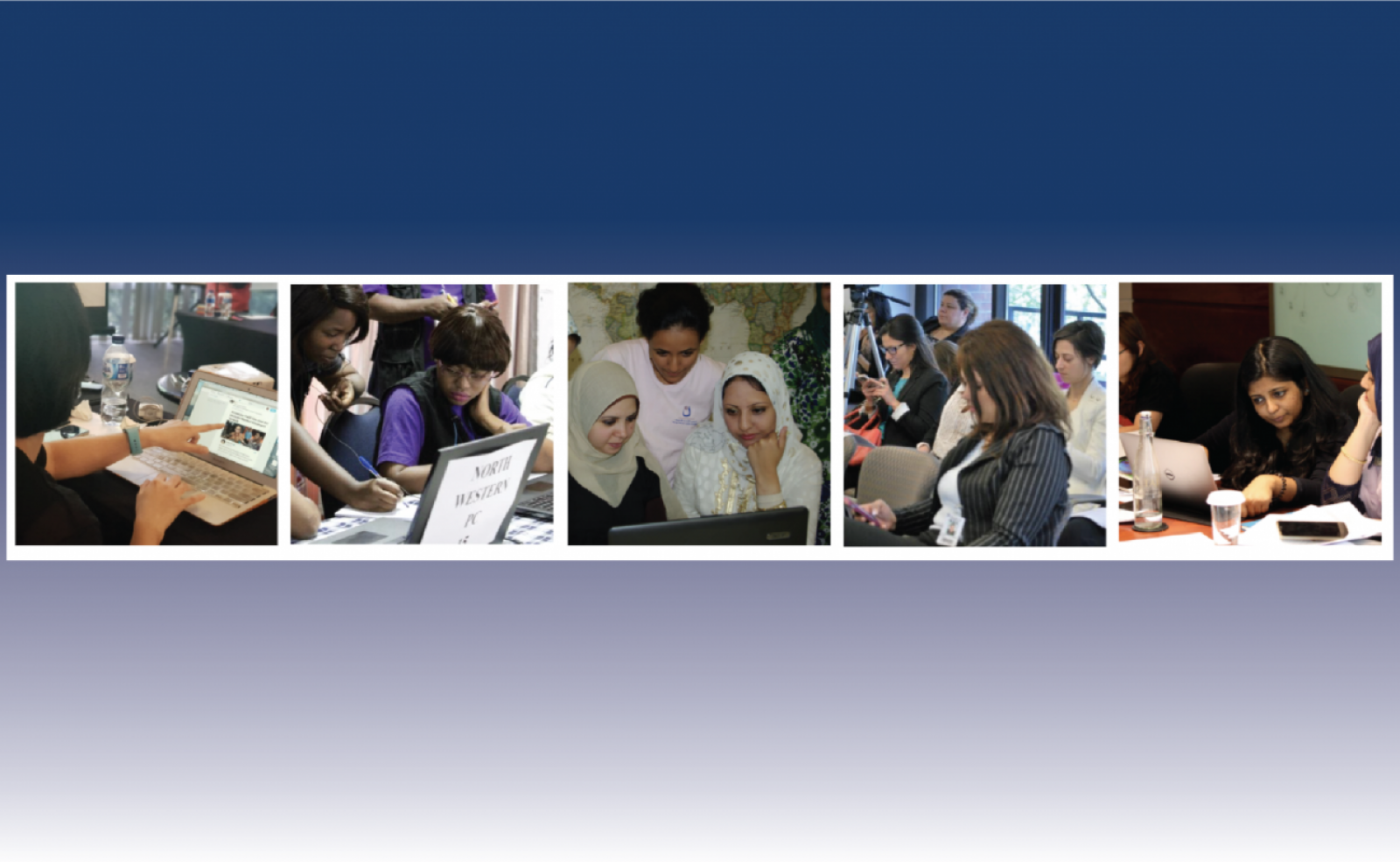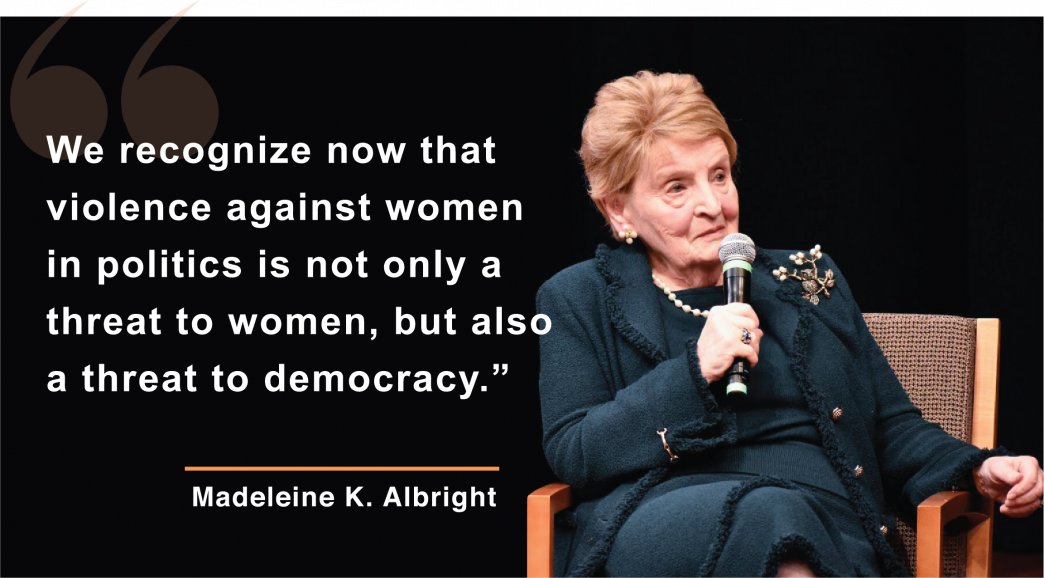
NDI believes all people have the right to live in a world that respects their dignity, security, and political rights—and the digital world is no exception. A critical investment to advance democracy is to create an internet that enables all people to be politically engaged. This is why, for years, NDI has worked to address the gendered attacks, including disinformation, faced by 50 percent of the world’s population when attempting to engage online.
Online violence against women in politics poses a deepening challenge to democracy, serving as a key tool of illiberalism and democratic backsliding across the globe. Violence against women in politics encompasses all forms of aggression, coercion and intimidation seeking to exclude women from politics simply because they are women. Gendered disinformation is a form of violence that refers to activities that attack or undermine people on the basis of gender, or weaponizes gendered narratives to promote political, social or economic objectives. This online behaviour seeks to achieve political outcomes: targeting individual women to harm them or drive them out of public life, while also sending a message that women in general should not be involved in politics.To raise awareness of this issue, NDI launched the #NotTheCost campaign as a global call to action in 2016, and a renewed call in 2021. The campaign’s title reflects the fact that many women are told that harassment, threats, psychological abuse (in person and online), physical and sexual assault are “the cost of doing politics.” Since the campaign’s launch, NDI has been working to challenge this claim by raising awareness of the violence that politically-active women face, collecting data on it, and building capacity among partners to mitigate its impact and hold perpetrators to account.
The Chilling Effect
The impact of this online violence is to have a chilling effect on the political ambitions and engagement of women and girls, decreasing their presence and agency in politics and public life, as outlined in NDI’s Tweets that Chill report. A global survey of 14,000 girls in 22 countries found that 98% use social media, and half reported being attacked for their opinions before they were old enough to vote. As a result, almost 20% of respondents stopped posting their opinion.
Increasingly, this online violence is part of intentional, political tactics by illiberal and anti-democratic forces to suppress the numbers of politically-active women and to constrain the diversity of voices and agendas that are heard in public discourse. The need to counter the violence that women in politics face online is not just an important facet of promoting women’s equitable political participation, but is essential to modern democracy and civic engagement.
This Is A Solvable Problem
Stopping gender-based attacks online is solvable, and it is the fastest and clearest investment toward building an internet that enables everyone to be politically engaged.
Online spaces and the platforms that host them have consistently enabled the misogyny that politically-active women face in person to migrate to the online space. While a tech solution to misogyny does not exist, a tech solution to misogyny online most certainly does. Inaction by social media companies on gendered disinformation and attacks online is a choice that tips the political scales, and it is long overdue for change.
Focus On Solutions
In March 2021, NDI launched its Renewed Call to Action to stop violence against women in politics. At the launch, Secretary Albright announced a plan for NDI to work with other key stakeholders to convene a solutions-based summit bringing together government officials, political women, women's rights organizations, business leaders, and digital platforms to agree on and create global momentum for action to end the illiberal and anti-democratic influence of online violence and gendered disinformation against women in politics.
In October 2022, NDI released a list of interventions that technology platforms, governments, civil society, and the media can take to make progress towards ending online violence against women in politics.
Recent Events:
Empowering Prosperity: Advancing Women to Advance the Status of Democracy. NDI's Director for Gender, Women and Democracy, Sandra Pepera, moderated a panel hosted by the U.S. Department of State at the second Summit for Democracy. Secretary Antony Blinken chaired the event that highlighted how tech-facilitated gender-based violence (TFGBV) is a direct threat to democracy and rights-based societies. The event showcased the work of the Global Partnership for Action on Gender-Based Online Harassment and Abuse and NDI's leading work on the issue.
Renewing Democracy: A Global Partnership to End Online Harassment and Abuse NDI hosted an event with the U.S. Department of State to launch the new Global Partnership for Action on Gender-Based Online Harassment and Abuse on Wednesday, March 16, 2022, at a Commission on the Status of Women event. The Global Partnership aims to bring together governments, civil society organizations, international organizations and the private sector to focus on ending online gender-based harassment and abuse. The initial member countries of this partnership are the United States, Denmark, the United Kingdom, Sweden, Australia and the Republic of Korea. Each was represented at the event at senior government levels.
Tackling Online Harassment of Women in Public Life. NDI's Director of Democracy and Technology, Moira Whelan, spoke on a panel co-hosted by NDI and the Annenberg Public Policy Center discussing online harassment and violence against women in public life and the threat it poses to inclusive democracy.
The Chilling Effect: Hate, Misogyny, and the Digital Information Disorder. Although the digital space continues to extend the promise of extraordinary opportunities for expanding the voice and agency of women, girls and marginalized groups, it has fallen short of our ideals. NDI collaborated with the White House Gender Policy Council on a side event at the 2021 Summit for Democracy on the chilling effect of online violence against women and how to address it.
Addressing Online Misogyny and Gendered Disinformation. Nina Jankowicz of the Wilson Center and Neema Iyer, Founder of Pollicy discuss how gendered disinformation and online misogyny impact women worldwide. From Uganda to Ukraine, gendered disinformation is a form of Online Violence Against Women in Politics (VAW-P) that can drive women away from political participation and public life entirely. See NDI's new report on Addressing Online Misogyny and Gendered disinformation, which outlines recommendations for those working globally to mitigate the democratic harms of disinformation, to ensure women’s safe participation and leadership in politics, and to monitor the social media and information environment in elections.
Resources:
- Interventions to End Online Violence Against Women in Politics
- Examining State-Based Disinformation Campaigns During Times of Crises
- #NotTheCost: Stopping Violence Against Women in Politics, Renewed Call to Action
- Tweets that Chill: Analyzing Online Violence Against Women in Politics
- Engendering Hate: The contours of state-aligned gender disinformation online
- Addressing Online Misogyny and Gendered Disinformation: A How-to Guide
- CEPPS Countering Disinformation Guide: Understanding the Gender Dimensions of Disinformation
- Votes Without Violence: A Citizen Observer’s Guide to Addressing Violence Against Women in Elections
- Think10: A Safety Planning Tool
- Digital Safetea
- Choose Your Own Fake News
- Alternate Realities, Alternate Internets
- Platform Accountability: Business Cases for Technology Platforms to Implement the Top Interventions to Address Online Violence Against Women in Politics
- Guidelines for the construction of a parliamentary code of conduct to protect women from online gender-based political violence based on the experience of Latin America
Recent Articles:
- https://www.ndi.org/our-stories/global-partnership-end-online-violence-against-women-presents-opportunities-tech-and
- https://www.devex.com/news/opinion-system-failure-online-misogyny-and-democracy-99481
- https://www.demworks.org/its-their-world-long-theyre-not-online-young-women-and-politics
- https://www.devex.com/news/q-a-how-can-civi-tech-advance-gender-equality-99282
- https://www.wilsoncenter.org/publication/malign-creativity-how-gender-sex-and-lies-are-weaponized-against-women-online
- https://www.foreignaffairs.com/articles/world/2021-11-30/how-disinformation-corrodes-democracy
For more information on NDI’s work to end online violence against women in politics, please contact: [email protected] and [email protected]
